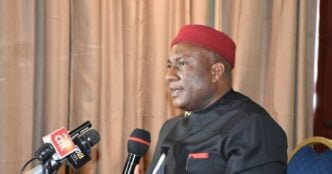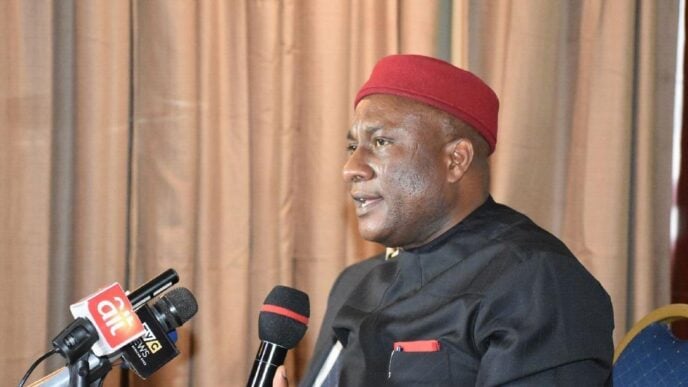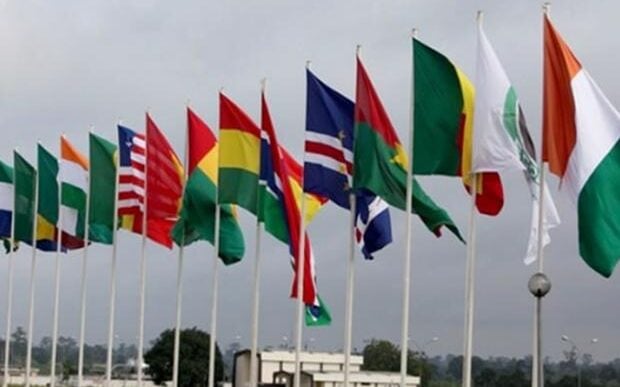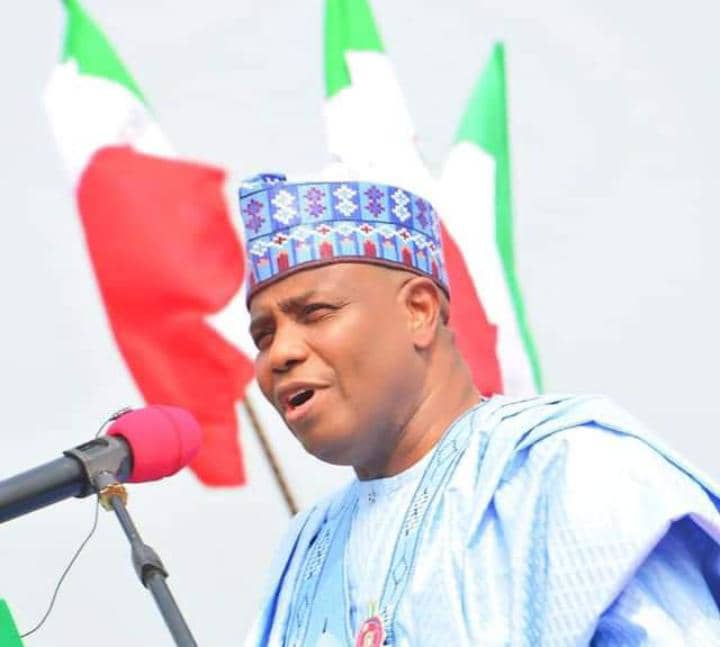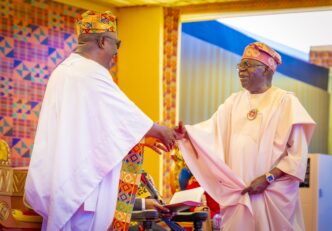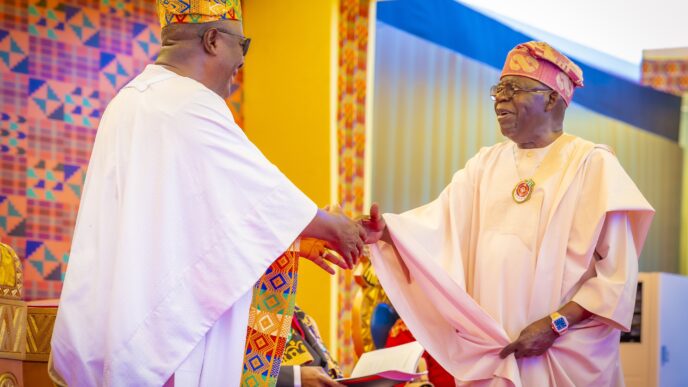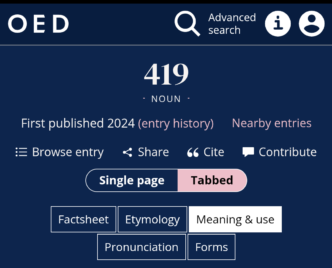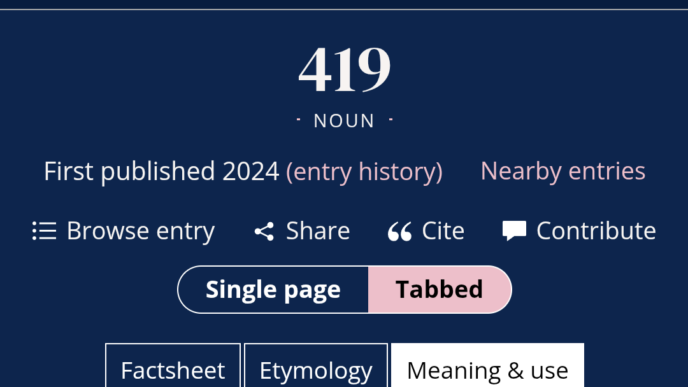Children fetching water from a hand pump borehole at Garin-Gambo village, Gumel LGA of Jigawa
BY OGUNTOYE OPEYEMI
In 1942, during the Second World War, Vernon and Elmer’s family in an American city supported their sons’ decision to enlist and fight in a distant war in Scotland. After 10 months of silence from the front lines, they patiently waited for any news. However, none arrived. The family sent several letters, but still received no response. Concerned and exhausted, their mother, feeling lonely, disappointed, and wary, left her home to visit the US First Lady, Mrs. Roosevelt, at the White House.
Though she was not allowed to meet Mrs Roosevelt, the mother made the bold decision to stay outside the gates for days. One night, drenched by heavy rainfall, she remained standing in the downpour when Mrs Roosevelt, noticing her, became curious. Mrs Roosevelt quickly contacted her assistant and was informed that the woman had insisted on seeing her. Recognising the gravity of the situation, Mrs Roosevelt stepped outside to meet her.
This encounter gave the mother the opportunity to explain the dire situation at the front lines, where many enlisted sons and daughters had not been able to contact their families for nearly a year due to inefficiencies in the US Army postal system. Taking swift action, Mrs Roosevelt brought the issue to President Roosevelt’s attention. As a result, the Six Triple Eight team was given the responsibility to address these postal service problems, ultimately resolving the long-standing issues. For their efforts, the team received numerous medals for their bravery and leadership.
Advertisement
This episode highlights a fundamental foundation of progressive leadership in the United States, where ordinary citizens could approach the highest office and receive solutions to their difficult and pressing issues.
Post-independence, Nigeria came close to achieving real progress, especially through its regional governments. The democratic system practised during this era is considered one of the best the country has known. In particular, the south-west region witnessed tremendous development. For instance, it provided quality water solutions across the states, and to this day, state-run water boards in places like Oyo, Ogun, and Lagos continue to operate effectively. Many households still rely on these state-run systems, which are cheaper to maintain compared to private boreholes.
The south-west was also one of the largest revenue earners in the country, thanks to its thriving cocoa and other agricultural exports. Cocoa, in particular, was a major foreign exchange earner for Nigeria in the 1950s, ’60s, and ’70s. By 1970, Nigeria was the second-largest cocoa producer in the world. Unfortunately, the shift to oil exploration in the 1970s and ’80s led to the neglect of cocoa production, which saw a significant decline in the country’s share of the global market. By 2010, cocoa production accounted for only 0.3% of Nigeria’s agricultural GDP.
Advertisement
Today, state engagement and communication are often limited to the state capitals, leaving many citizens across the state without a voice. For example, in Ibadan, the state capital of Oyo, state engagements are typically held, but only political party members are allowed to ask questions. This creates a disconnect, making it difficult for the governor to understand the issues faced by people in other cities and towns, as they have no direct platform to communicate with the state’s leadership.
This inefficiency has been a hallmark of governance in Nigeria since the Second Republic. During election campaigns, gubernatorial candidates make sure to visit every corner of the state, sometimes reaching even the smallest wards. However, once they are elected, these same leaders often limit their travels to the state capital or, at best, make brief visits to commission projects, which usually take no more than two hours. These short trips provide little opportunity for the leaders to engage with the people or understand their real issues. Some commissioners and aides are even known to take the fastest routes to avoid underdeveloped areas, perpetuating neglect in many parts of the state.
The political rivalry between Chief Awolowo and Chief S.L. Akintola, well-documented through various publications, shows that the country has often been plagued by selfish leaders. Despite their disagreements, their rivalry did not lead to the kind of bloodshed and underdevelopment witnessed in other parts of the country, such as Rivers and Edo states. This stands as proof that Nigeria has been unfortunate in having leaders who prioritise their personal agendas over the greater good, often seeking to destroy societal values and systems simply because they do not have their way.
Many young people, inspired by the ideals of past progressive leaders, have entered politics with hopes of reviving these values of unity and progress. For example, in Oyo State, there are signs of a return to more responsible governance, rooted in the state’s historical values. However, between 2003 and 2015, certain political gladiators collected a significant percentage of state revenue from the governors, supported by powerful federal forces. This made it difficult for governors to engage fully with political actors intent on causing disharmony in the state, many of whom disguised themselves as political thugs or assailants.
Advertisement
Fortunately, the advent of social media has given citizens a platform to report irregularities and abuses of power, a feature that was absent in the darker days of Nigerian politics. One such tragedy occurred in Oyo state under the rule of former Governor Alao Akala in 2011, when violence became entrenched in the state’s National Union of Road Transport Workers (NURTW). During the heated re-election campaign of Akala, the Labour Party’s campaign train in Ogbomoso was attacked by NURTW members. The union members, identified and arrested, used stones to kill a prominent member of the Labour Party in broad daylight.
Recall the internal disagreements and public engagement between the embattled FCT minister and his successor, Governor Fubara. The entire country closely followed the case, with daily press briefings from both camps. In fact, the police remained steadfast in ensuring peace, despite the rhetoric, posturing, and threats from both factions. It’s also worth noting that the president, as the leader of the country, stepped in at the right time to de-escalate the situation. However, this intervention was not the case in 2010.
The country also remembers the shocking events that occurred in Oyo during the PDP primaries, which were meant to produce delegates for the party’s gubernatorial candidate. After the death of Lamidi Adedibu, who had dominated the party in the state, a rift emerged between his followers, including the then-incumbent Governor Alao Akala, and his predecessor, the Senate Leader Oloye Teslim Folarin. Both factions continued the modus operandi of their late leader, often employing the NURTW as a tool to forcefully assert power. For Folarin to have a chance at the proposed state party congress, he sought the assistance of one of the leaders, Abdul-Lateef Akinsola Oloruntoki (a.k.a Tokyo), who escorted them to the congress. Meanwhile, another leader, Abdul-Lateef Salako (a.k.a Eleweomo), was also present to protect the incumbent governor’s interests. While neither of these leaders was an official member of the PDP, it was a fateful day for Eleweomo, who met his tragic end in the process. Such violence continued until a year ago when Governor Seyi Makinde took decisive action against the state’s NURTW chairman, Mukaila Lamidi (a.k.a Auxillary).
For many who grew up in the western part of the country, the dark days of political violence are well-remembered, as fear often ran rampant during political gatherings or NURTW-sponsored events. While there has been some progress in security, particularly during political transitions, developmental projects remain a critical ingredient for nation-building.
Advertisement
One of the fundamental drivers of development in any country is the efficient operation of local government councils. However, this has not been the case in many Nigerian states. For instance, in towns like Ondo in Ondo state and Oyo in Oyo state, the presence of local government governance is nearly invisible. Successive state governors have crippled local government financial activities due to an over-reliance on allocations for debt servicing, corruption, and unnecessary state government projects. This has led to poor performance by appointed caretaker committees, further undermining the effectiveness of local governance.
In contrast, the progress seen in Lagos and Kaduna is remarkable, and it’s clear that visionary leadership can lead to meaningful local development. Any forward-thinking governor should take note of these successes, yet many ignore the progress being made in these areas. In Lagos, the transformation in Kosofe LCDA over the last four years has far surpassed the development seen in Ogbomoso South, North, and Orire Local Governments over the past two decades.
Advertisement
Many governors prioritise irrelevant, inflated projects rather than focusing on developing rural and local communities. The development strides achieved in Kaduna in the last nine years were largely due to the visionary leadership of former Governor El-Rufai. Under his guidance, the state became one of the few to embrace open and transparent governance, as recognised by organisations like BudgIT. The foundation he laid promises to continue ensuring progressive governance for years to come.
In contrast, some states in the south-west, particularly Oyo, continue to hinder regional progress. The current governor has refused to implement measures that would allow for the full development of local governments. A visit to regions like Ogbomoso, Oyo, and Oke-Ogun reveals the neglect and lack of attention these areas have suffered. With elections less than two years away, political parties will be canvassing for votes with promises of transformative agendas. Citizens must rise above party affiliation, religion, or birthplace when choosing their leaders.
Advertisement
It is time for the people of Oyo, Ogun, Ekiti, Osun, and other states to demand leaders who have shown compassion, vision, and a clear policy for the future, regardless of political affiliation.
Fortunately, there is now progress at the federal level with the creation of regional developmental commissions, recently signed into law by the president. This bold move has the potential to bring about positive change. However, for these reforms to have a lasting impact, the local government must function effectively. Only then can Nigeria experience the kind of progressive change seen in first-world nations.
Advertisement
Oguntoye Opeyemi can be contacted via Twitter @EquityOyo
Views expressed by contributors are strictly personal and not of TheCable.
Add a comment

